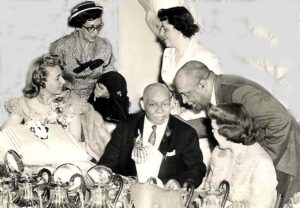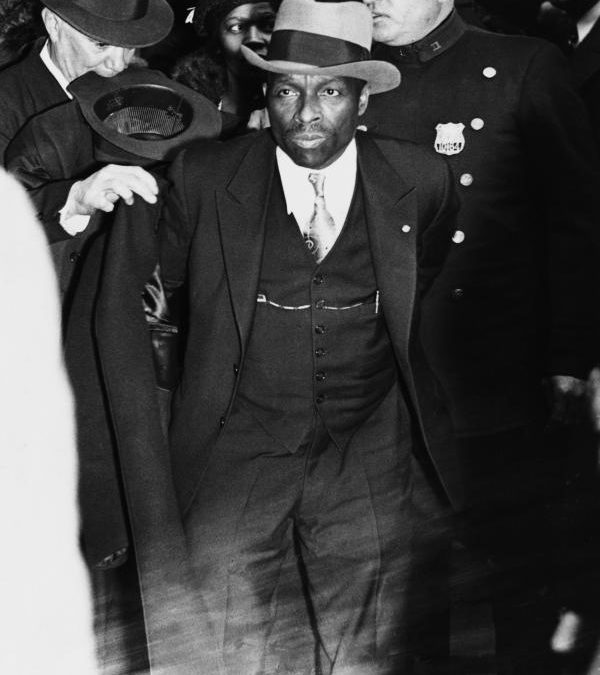Father M.J. Divine’s role as a forerunner of the Civil Rights Movement is often overlooked and even dismissed.
Although he’d been actively working toward racial integration and harmony long beforehand, the Harlem Riot of 1935 seems to have served as a catalyst.
As at many times in history, racial tensions were high in the 1930s. It was the midst of the Great Depression, and it didn’t take much for anger to boil over. The Harlem Riot was sparked after a mere rumor — later proved to be false — that police had killed an African American teenager. Historians often cite it as the first modern race riot.
By the time the riot was over, according to BlackPast.org, “Three African Americans were killed and nearly sixty were injured. Seventy five people, mostly blacks, were arrested by the police. The riot caused over $200 million in property damage.”
This culmination of events — happening right where the Peace Mission had its strongest presence at the time — inspired Divine to become more politically active and seemed to strengthen his resolve to fight for Civil Rights and racial equality. Here are a few highlights of his work:
- By 1939, his Peace Mission Movement had organized the first “Divine Righteous Government Convention.” The political movement’s delegates opposed school segregation and many of the social programs initiated by President Franklin Delano Roosevelt — a position in keeping with Divine’s beliefs that welfare, Social Security and other forms of aid were “handouts.”
- Around 1940, Divine drafted an anti-lynching petition to Congress, seeking equal protection for all, and trials and convictions for all members of lynch mobs. Although it garnered 250,000 signatures, it failed to gain traction. (In fact, Divine’s anti-lynching petition was one of about 200 sent to Congress between 1882 and 1968. And though these inspired several anti-lynching bills, none ever became law.)
- In 1951, Divine called for reparations to be paid to descendants of slaves. He tirelessly argued in favor of integrated neighborhoods.
- Over the years, Divine used the Peace Mission to purchase property in all-white areas for his mixed-race followers. One of those was a Hudson River estate that was opposite the home of then-President Franklin D. Roosevelt; another was a luxury beachfront hotel, including rights to the beaches and sidewalks, in Brigantine, N.J. — a move that infuriated residents used to years of segregation.

Father Divine’s attorney, J. Austin Norris, at right, speaks to Divine during a banquet.
During a visit to one of the Peace Mission’s banquets in 1957, Father Divine’s attorney, J. Austin Norris, praised Divine’s work to bring about racial equality. According to Peace Mission records, Norris said, “No man, no personality in America, no personality the world over, has contributed more to bringing about what’s happening in Washington on the Civil Rights Bill than Father Divine! Let me tell you that all of the power of the darker people, that all the power of the liberals of this Country has been trying for seventy-five years to have Congress act on Civil Rights and they failed! But nobody has been a greater Example of Civil Rights and Civil Liberties than Father Divine and the Peace Movement!… And it has been that example that’s illuminated the way that has led to what’s happening here in Congress! I firmly believe that!
 Find out more about the man, the mystery surrounding him, and the International Peace Mission, in “Father’s Kingdom,” named an official selection for 2017’s DOC NYC. Reviewers are already calling the new film by Lenny Feinberg “One of DOC NYC’s best and probably 2017’s as well.”
Find out more about the man, the mystery surrounding him, and the International Peace Mission, in “Father’s Kingdom,” named an official selection for 2017’s DOC NYC. Reviewers are already calling the new film by Lenny Feinberg “One of DOC NYC’s best and probably 2017’s as well.”
“Father’s Kingdom” debuts at the IFC Cener tomorrow — Saturday, Nov. 11 — at 2 p.m., and will run again on Monday, Nov. 13, at 2:30 p.m.
[maxbutton id=”1″ ]


Recent Comments